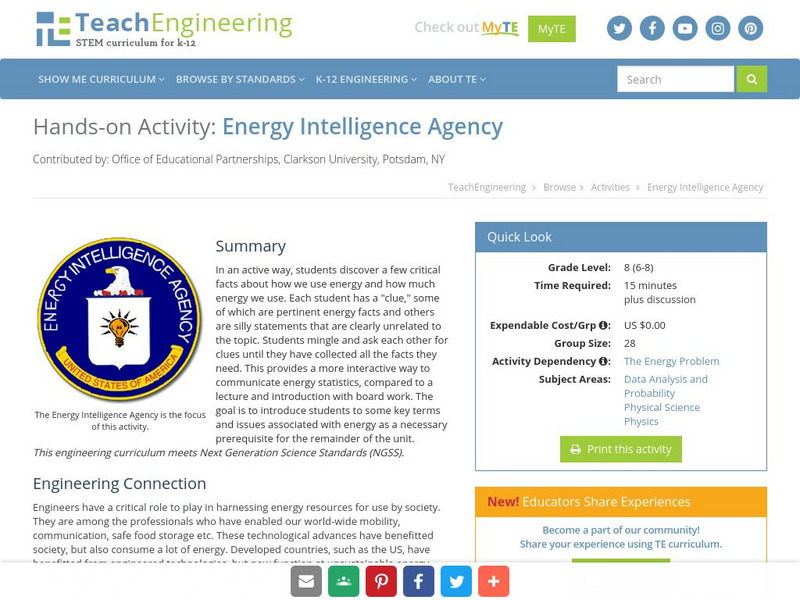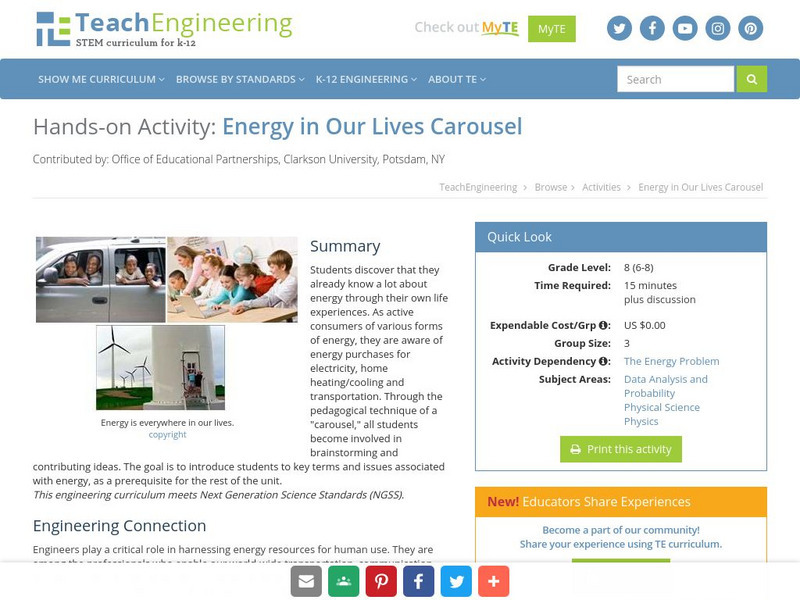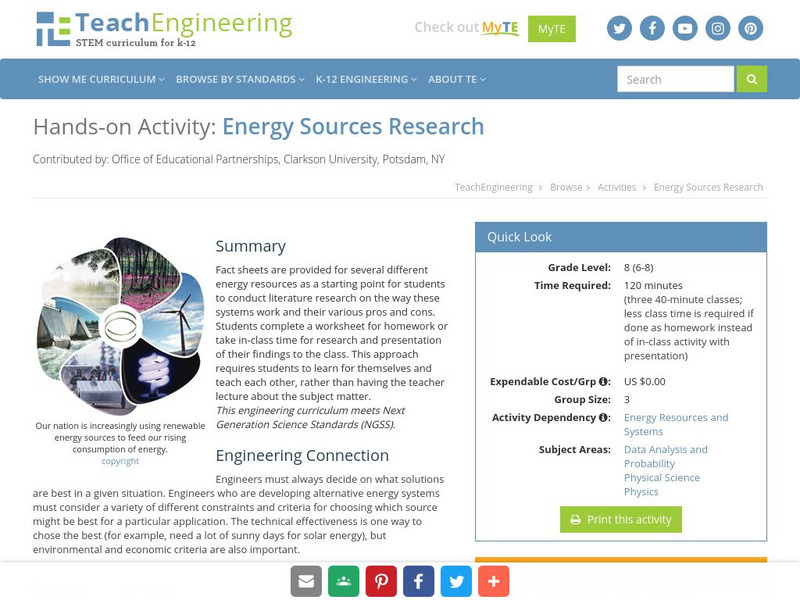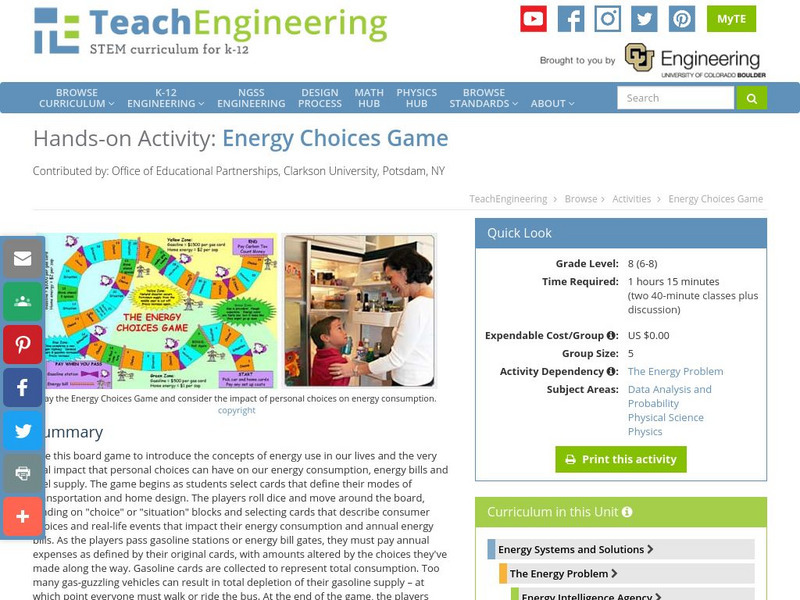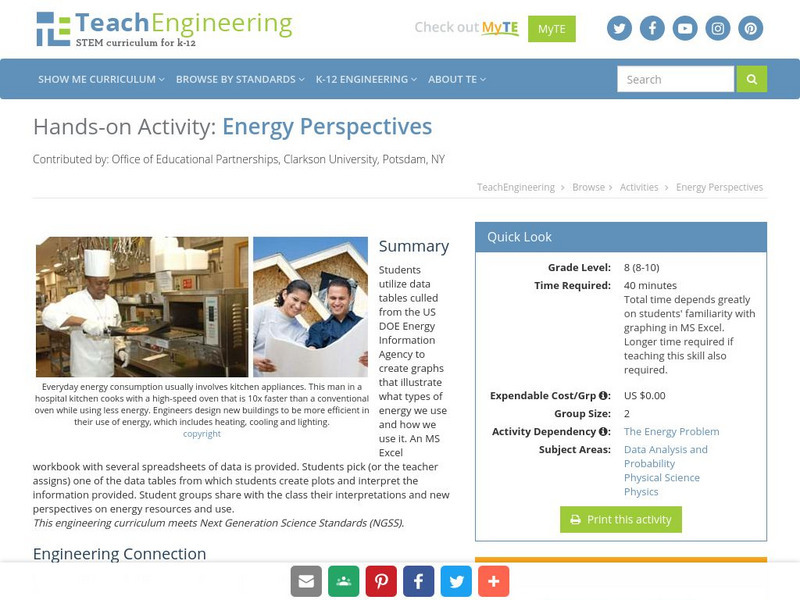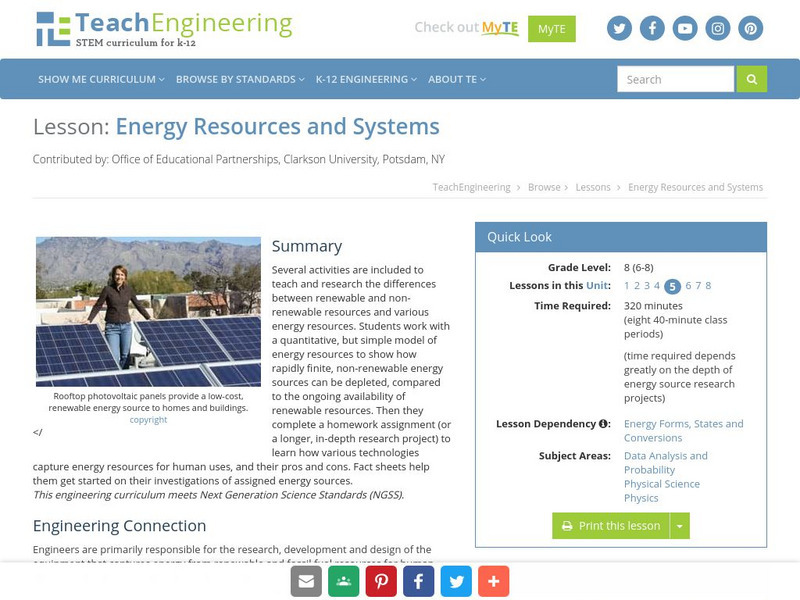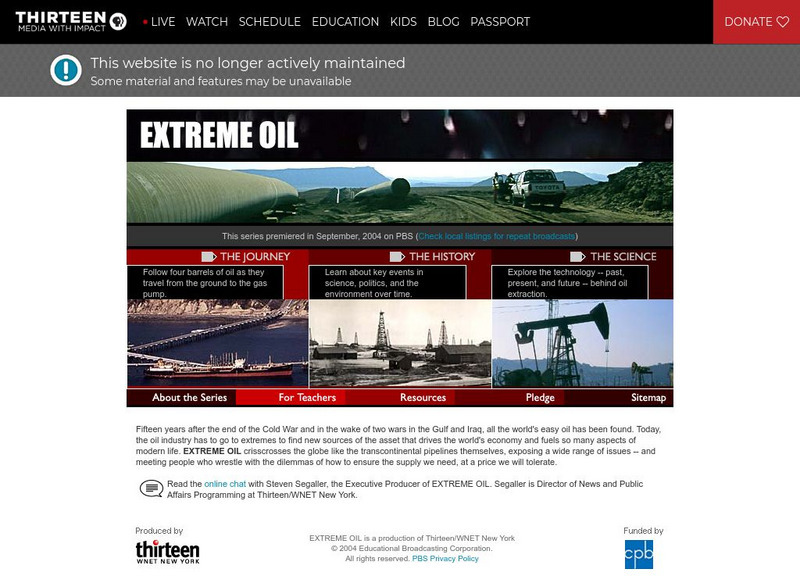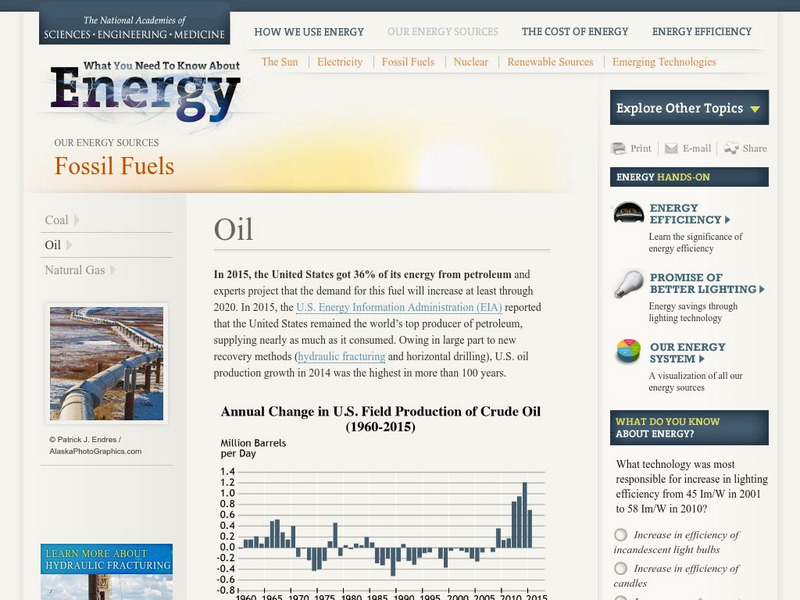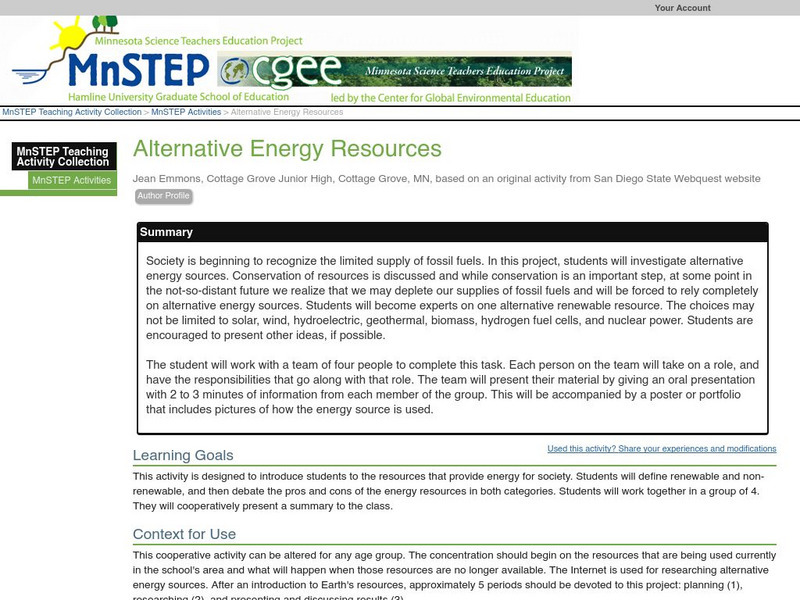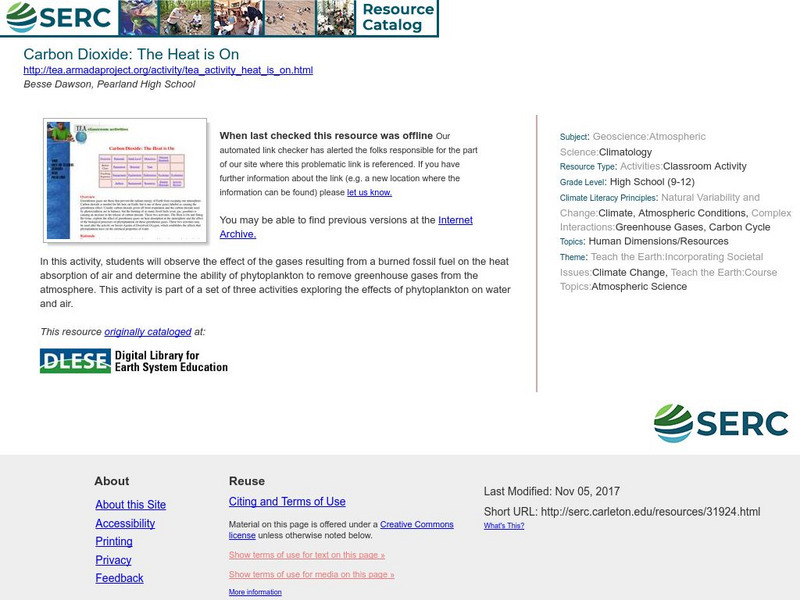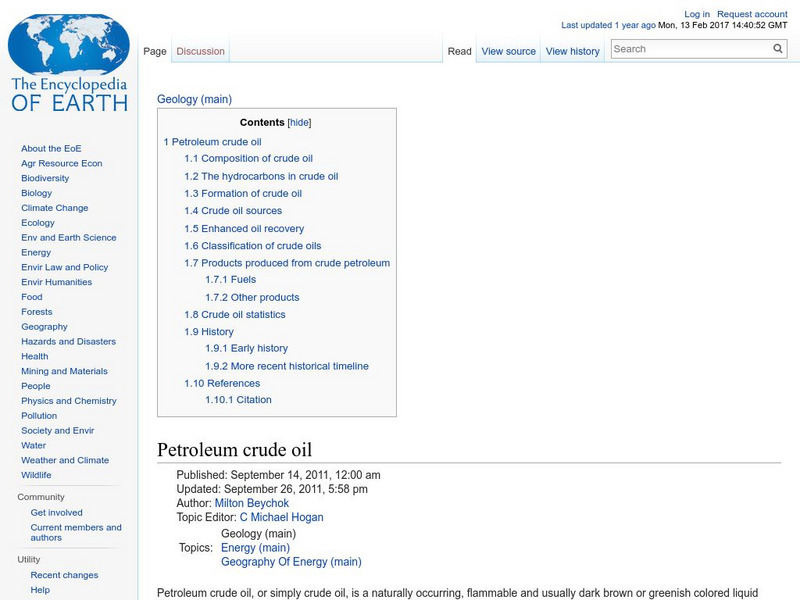Other
Texas Comptroller of Public Accounts: The Energy Report: Coal [Pdf]
Chapter 7 of a report on the energy industry in Texas. It looks at coal, its history, its uses, its economic impact in Texas, consumption, mining, and the transportation of coal. The process of generating electricity from coal is...
National Geographic
National Geographic: Natural Gas: A Cleaner Energy Solution?
For this activity, students read informational text on natural gas and compare it to other fossil fuels for its greenhouse gas emissions and environmental impact. They then prepare a pro or con position on whether natural gas is good...
TeachEngineering
Teach Engineering: Energy Intelligence Agency
This activity provides an active way for students to discover a few critical facts about how we use energy and how much energy we use. Each student has a "clue", some of which are pertinent energy facts and others are silly statements...
TeachEngineering
Teach Engineering: Renew a Bead
A quantitative illustration of how non-renewable resources are depleted while renewable resources continue to provide energy. The activity requires students to remove beads (units of energy) from a bag (representing a country). A certain...
TeachEngineering
Teach Engineering: Energy in Our Lives Carousel
This activity is a way for students to discover that they already know a lot about energy through their own life experiences. As active consumers of various forms of energy, they are aware of energy purchases for electricity, home...
TeachEngineering
Teach Engineering: Energy Sources Research
Fact sheets are provided for several different energy resources as a starting point for students to conduct literature research on the way these systems work and their various pros and cons. Students complete a worksheet for homework or...
TeachEngineering
Teach Engineering: Energy Choices Game
Use this board game to introduce the concepts of energy use in our lives and the very real impact that personal choices can have on our energy consumption, energy bills and fuel supply. The game begins as students select cards that...
TeachEngineering
Teach Engineering: Energy Systems
Posters are provided for several different energy conversion systems. Students are provided with cards that give the name and a description of each of the components in an energy system. They match these with the figures on the diagram....
TeachEngineering
Teach Engineering: Energy Perspectives
Students utilize data tables culled from the US DOE Energy Information Agency to create graphs that illustrate what types of energy we use and how we use it. An MS Excel workbook with several spreadsheets of data is provided. Students...
TeachEngineering
Teach Engineering: Corn for Fuel?!
In this activity, students examine how to grow plants the most efficiently. They imagine that they are designing a biofuels production facility and need to know how to efficiently grow plants to use in this facility. As a means of...
TeachEngineering
Teach Engineering: Engineering for the Earth
Young students are introduced to the complex systems of the Earth through numerous lessons on its natural resources, processes, weather, climate and landforms. Key earth science topics include rocks, soils and minerals, water and natural...
TeachEngineering
Teach Engineering: Energy Resources and Systems
Several activities are included to teach and research the differences between renewable and non-renewable resources and various energy resources. Learners work with a quantitative, but simple model of energy resources to show how rapidly...
PBS
Wnet: Thirteen: Extreme Oil
This in depth look at oil charts the history, journey, and science behind this industry. Much effort, manpower, and resources are placed behind the extraction, acquisition, and sale of this valuable resource. This segment provides an...
Nature Research
Nature Education: Energy Economics in Ecosystems
This article discusses how plants and microorganisms, until recently, have mostly controlled how much carbon dioxide is released into an ecosystem, and explains how this process works. Humans' burning of fossil fuels has upset the...
American Museum of Natural History
American Museum of Natural History: Ology: Rising Co2! What Can We Do?
With this resource, students learn how much fossil fuel emissions have increased since 1600 by exploring a graph showing carbon dioxide in our atmosphere. Then answer questions and read facts about climate change over the centuries....
National Academies of Sciences, Engineering, and Medicine
The National Academies: Our Energy Sources: Natural Gas
Energy production from natural gas is less destructive to the environment than energy produced from coal, but it is still produced from fossil fuels. While advances have been made in reducing its detrimental effects, our resources are...
National Academies of Sciences, Engineering, and Medicine
The National Academies: Our Energy Sources: Oil
The United States has a huge dependency on oil as an energy source. Efforts are being made to reduce this for many reasons, the main ones being the security of this source and the impact on the environment. Transportation is one area...
Cosmo Learning
Cosmo Learning: The Inside Story of Modern Gasoline
The inside story on gasoline as told by the Standard Oil Company. This documentary was made in 1946 and explores the molecules that make up crude oil. Learn how the crude oil molecules are separated to make up usable forms like gasoline,...
Energy for Sustainable Development
Esd Bulgaria: Kids & Energy: Natural Gas
Learn how natural gas forms, how scientists find it beneath the Earth's surface, and how it is produced, stored, and transported.
Science Education Resource Center at Carleton College
Serc: Alternative Energy Resources
Society is beginning to recognize the limited supply of fossil fuels. In this project, students will investigate alternative energy sources. Conservation of resources is discussed and while conservation is an important step, at some...
Science Education Resource Center at Carleton College
Serc: Carbon Dioxide: The Heat Is On
In this activity, students will observe the effect of the gases resulting from a burned fossil fuel on the heat absorption of air and determine the ability of phytoplankton to remove greenhouse gases from the atmosphere. This activity is...
Energy for Sustainable Development
Esd Bulgaria: Kids & Energy: Energy Timelines
A collection of timelines showing the history of developments in the use of different fuels and methods of getting energy - wood, electricity, coal, oil, nuclear power, and fuels used in transportation.
Encyclopedia of Earth
Encyclopedia of Earth: Geology: Petroleum Crude Oil
Article explaining what petroleum crude oil is, its composition, how it is formed, sources, how it is recovered, different classifications, products made from it, and its history. Includes a chart showing statistical information for...
PBS
Nova: Car of the Future
In this activity, student teams research and develop a proposal to decrease the carbon footprint of their city's/town's public transportation system and then prepare a report that explains why their transportation plan is the best for...


![Texas Comptroller of Public Accounts: The Energy Report: Coal [Pdf] eBook Texas Comptroller of Public Accounts: The Energy Report: Coal [Pdf] eBook](https://d15y2dacu3jp90.cloudfront.net/images/attachment_defaults/resource/large/FPO-knovation.png)

